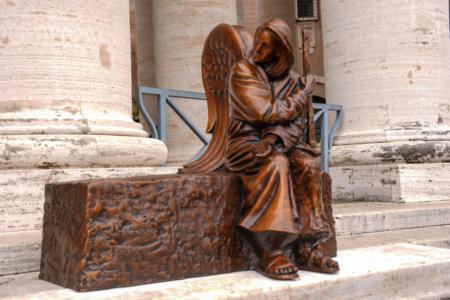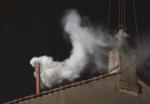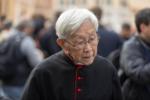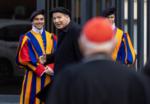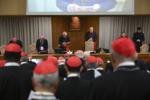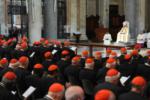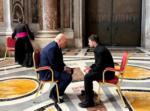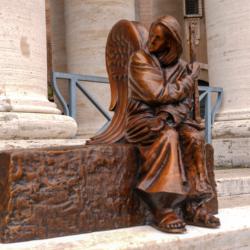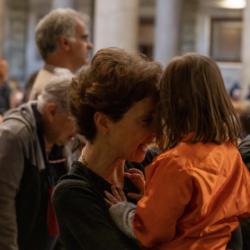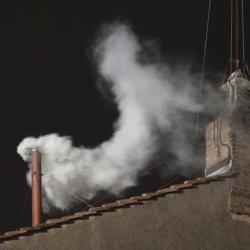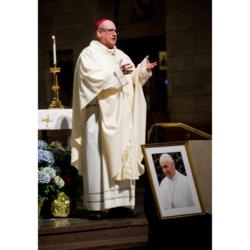Archdiocese praised in abuse audit
The United States Conference of Catholic Bishops (USCCB) released the findings of an extensive review of each diocese’s compliance with the national Charter for the Protection of Children and Young People Jan. 6. Archbishop Seán P. O’Malley and representatives of the archdiocese dealing with the aftermath of the clergy abuse scandal met with the media to discuss how the Archdiocese of Boston fared in the national audit.
At the press conference, Archbishop O’Malley announced that the Archdiocese of Boston was found to be in “full compliance with the charter.” The archdiocese also received two commendations for its victim outreach and abuse prevention programs.
"Our full compliance demonstrates how seriously the Church of Boston is committed to erasing the scourge of child abuse from our midst," the archbishop stated.
The national clergy abuse scandal first erupted in Boston two years ago, with revelations of similar instances of clergy sexual abuse arising in dioceses throughout the country. The USCCB adopted its child protection charter in June 2002 to address the crisis.
The USCCB’s Office for Child and Youth Protection, headed by former FBI agent Kathleen McChesney, is responsible for producing a yearly report on each diocese’s compliance with the charter. The office employed the Gavin Group of Boston to audit each of the 195 dioceses in the country.
Archbishop O’Malley thanked victims for the “courage” they have demonstrated in bringing their allegations forward. He also commended Barbara Thorp, director of the Office for Pastoral Support and Outreach, and Deacon Anthony Rizzuto, director of the Office for Child Advocacy, Implementation and Oversight, whose efforts were praised in the audit.
The archbishop recognized that further steps need to be taken to protect children “from any form of abuse, not just in the community of the Church, but in all of society.”
The Archdiocese of Boston received seven recommendations from the panel in addition to the two commendations. The report said recommendations were given when implementation of a particular article of the charter was “incomplete” or when “significant improvement” could be made by an additional or changed procedure.
The Archdiocese of Boston did not receive any “instructions” from the auditors. Instructions were given when immediate action was necessary to bring a diocese into compliance with the charter.
According to archdiocesan spokesman Father Christopher Coyne, five of the seven recommendations had been fully remedied as of Dec. 1.
He said the two remaining recommendations — to better inform the public of the procedures involved in filing an abuse complaint and to develop a record-keeping system to track allegations that have been reported to the attorney general — have been recently addressed by the archdiocese.
Father John Connolly, who has worked to bring the archdiocese into compliance with the charter, told the media that Deacon Rizzuto is finalizing a brochure detailing how to bring an allegation of abuse to the archdiocese’s attention. The brochure, which will be distributed through parishes, schools and archdiocesan institutions, will also be posted on the archdiocesan website, Father Connolly said.
According to Father Coyne, a record keeping system to document allegations was established in late November.
Auditors have “agreed that we are now in full compliance with the charter,” said Father Coyne. “We have addressed [the recommendations] and taken them to heart.”
He went on to state that while the archdiocese has been considered compliant, work will continue to improve and strengthen archdiocesan abuse programs, policies and procedures.
Father Connolly, who acted as the archdiocesan liaison to the auditors, explained that receiving recommendations “does not suggest that we are out of compliance at all.” By observing abuse programs and policies around the country “auditors have learned the best practices that we could use,” he explained.
"I don't think there is a sense of disappointment" at having received recommendations, Father Connolly continued. "We are grateful to the auditor for making suggestions that can help us to refine and improve our own efforts to protect children and to serve the Church."
The archdiocese was commended for “the excellence” of its victims outreach programs led by Thorp’s Office for Pastoral Support and Outreach. Since the settlement was announced in September, there has been a “significant increase” in the number of victims approaching the archdiocese for counseling and services,’’ she said.
Thorp acknowledged that there was “probably some hesitation during the legal process on the part of some survivors and some lawyers” to seek help from the archdiocese. However, the archdiocese has been willing to provide services to all victims, regardless of whether they had a pending suit or allegation, she said. Her office hopes to provide additional pastoral and spiritual services in 2004.
Deacon Rizzuto’s office was also praised for its work in training over 200,000 clergy, teachers, volunteers and other Church employees to detect and prevent child abuse. According to Deacon Rizzuto, a program to teach children about sexual abuse and inappropriate behavior was rolled out to approximately 56,000 children in Catholic elementary schools in the archdiocese.
Asked whether he thought the report would help restore faith in the Catholic Church in Boston, Father Coyne stated that the only way for the archdiocese to regain trust is to demonstrate continued openness and honesty.
"Trust will be reestablished parish by parish, family by family," added Father Connolly. "The folks in the parishes who are willing to step forward, willing to be part of how we better protect children and create safer environments are going to be the everyday Catholics in the pew and folks who make use of the services offered by the Catholic Church in this archdiocese."
Father Connolly also noted that the work of addressing child abuse in the archdiocese did not commence with the explosion of the scandal in early 2002 but has been an “ongoing effort.”
"Intense scrutiny on this issue has clearly come in the last two years, since January 2002, but it was an issue that was brought to light -- sadly, not handled effectively -- in the early 1990s," stated Father Connolly. "We've learned lessons from those mistakes. We want to do the best we possibly can to protect children and provide for their care when they are in our care."
